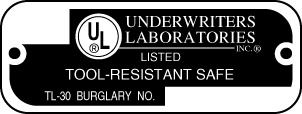Below we have provided information regarding
Safe and Vault ratings: Some of the ratings are for the type of
protection the safe provides (Fire and Burglary for example) and
there are ratings for the locks themselves. We have divided this
information into three sections below.
Be sure to visit our
Safe Information page for
more info.
- Safe Fire Ratings
- Safe Burglary Ratings
- Safe Lock Ratings
Safe Fire Ratings

Underwriters Laboratories
By far, the most respected name in testing is U.L. (Underwriters Laboratories).
You see the U.L. logo on many electronics and household products.
The most common fire rating is the Underwriters Laboratories (U.L.)
350 degree 1 hour rating. In order for a safe to earn this
rating, the manufacture must submit the safe to U.L., it is then
heated in a furnace at 1700 degrees for one hour. The inside
temperature cannot exceed 350 degrees, or the safe fails the
test. While the safe is heated, it is dropped to simulate a
second floor collapsing, the safe cannot burst open, or it
fails. The average house fire is 1200 degrees, and paper chars
at approximately 450 degrees.
Some safes will have a 2 hour 350
degree U.L. fire rating, this means the safe passed the same
test, with the time being 2 hours instead of 1 hour.
If you wish
to store computer disks, picture negatives, tapes, etc... in
your safe you will need a safe with a special fire rating. The
most common is the U.L. 125 degree 1 hour fire rating. This
means the inside temperature did not exceed 125 degrees, also,
did not exceed 80% relative humidity during the same test
mentioned above.
When shopping for a safe, look for a label or tag on the safe like the one pictured above.
Manufacturers Ratings
Some
manufacturers conduct their own fire tests or use the service of a similar company to U.L. These are usually
done along the same guidelines as the U.L. tests.
It's important to understand three things.
1: What temperature the test was
conducted at
2: The length (time) of the test
3: The maximum inside
temperature of the safe during the test.
Remember, the
average house fire is around 1200 degrees Fahrenheit and paper
chars at 450 degrees.
TOP
Safe Burglary Ratings


Many burglary ratings exist. If you intend to insure the contents of
your safe your insurance company might require your safe to meet
a minimum rating.
U.L. (Underwriters Laboratories) has numerous burglary ratings,
mostly for extremely heavy-duty type safes.
Safes with the Class "B" or Class "C" Burglary
Insurance Rating allow you to receive insurance coverage in
accordance with the Bank Safe and
Mercantile Safe Insurance
classifications. Pertinent insurance information is available
from Insurance Service Office, 160 Water Street, New York, New
York 10038.
TOP
Safe Lock Ratings

Many safes are supplied with an Underwriters' Laboratory U.L. Group 2
combination lock, U.L. Listed dual key lock or a U.L. Listed electronic lock this is important. U.L. has stringent tests for
safe locks. If the safe your considering doesn't have a U.L. Listed lock, it may not be designed for security.
TOP